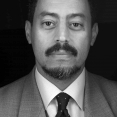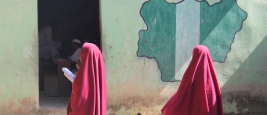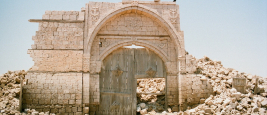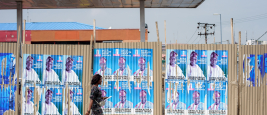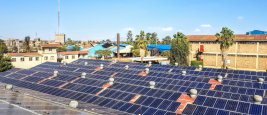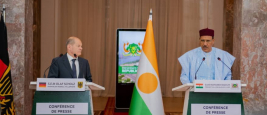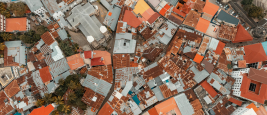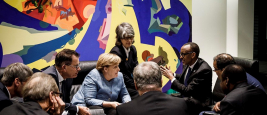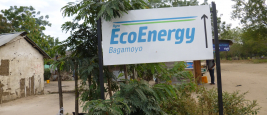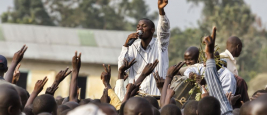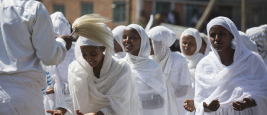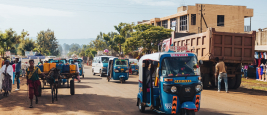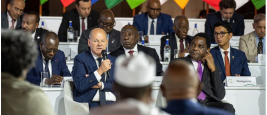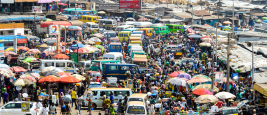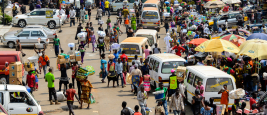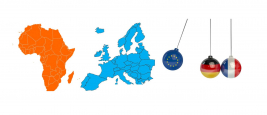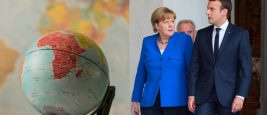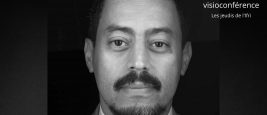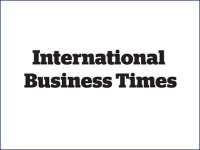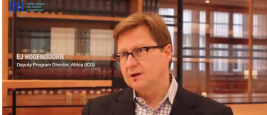Since 1999, when Nigeria returned to civilian government after successive military regimes, it has continued to face enormous challenges to its legitimacy and monopoly of the use of force.

Socio-economic Transformation of Africa
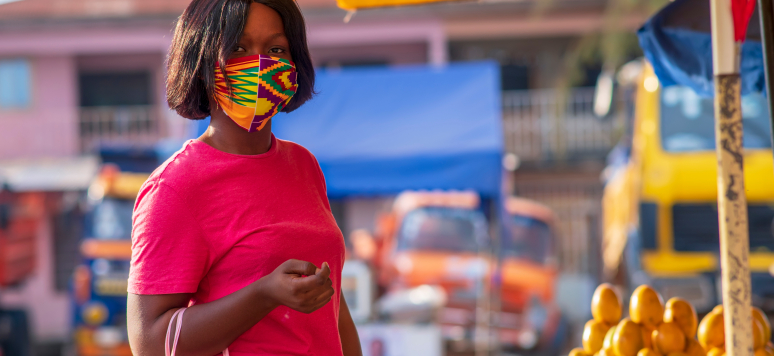
The Socio-economic Transformation of Africa research axis whithin Ifri's Sub-Saharan Africa Center focuses on African middle-classes, on African cities as a growth factor, on the urbanization of the continent as an element of transformation of African societies as well as on competition for access to land.
Research Fellow, Director of Ifri's Sub-Saharan Africa Center
...Research Fellow, Coordinator of the Governing the Urban Transition in Africa research program, Ifri's Sub-Saharan Africa Center
...Associate Research Fellow, Sub-Saharan Africa Center / Center for Energy and Climate
...Associate Research Fellow, Sub-Saharan Africa Center and Turkey/Middle East Program
...Associate Research Fellow, Coordinator of the Observatory of Central and Southern Africa, Sub-Saharan Africa Center
...Since the launch of the Opening Plan to Africa in 2003, Turkey's African policy has spread to the whole of the African continent, where its involvement is distinguished by its scope and diversity.
Nigerians will go to the polls on February 25 to elect a new president and members of the National Assembly. This marks the 7th in an unbroken sequence of presidential elections held since the country’s return to democracy in 1999.
After several decades of reforms, the situation in centralized power sectors has hardly changed. The sub-Saharan power sector remains underdeveloped, and power sectors are experiencing significant financial difficulties that have been further exacerbated first by the effects of the pandemic...
Germany, despite the reluctance of its public opinion, is committed to supporting security in the Sahel, notably through its participation in the European Union Training Mission in Mali (EUTM) and recently in Niger, and in the United Nations Multidimensional Integrated Stabilization Mission in...
By 2050, about 60% of the population of Sub-Saharan Africa will live in urban areas. The governance of the rapid growth of capital and intermediary cities in Africa is one of the priorities of the international development agenda.
In recent years, Germany’s Africa politics have been characterized by proactive international initiatives and the claim for a "partnership at eye level". However, a look at the power constellations of its cooperation indicates that inequalities are – contrary to Germany’s own claims – rather...
In Kenya, corruption results from a confusion of public and private interests that is specific to the neo-patrimonial logic in place since British colonization. The strong moral and political ethnicity that characterizes the country fuels an ambiguous relationship between the population and...
After more than ten years of hectic debates on international ‘land grabs’, academic interest in collapsed land deals or projects with unexpected results is growing.
Evolutions of the Religious Landscape in East and Central Africa East and Central Africa Observatory Conference
This conference will explore the major evolutions of the religious landscape in Central and East Africa. We will discuss the mutations observable in the Christian and Muslim worlds, the relations between religion and politics, and the development of various forms of radicalism, whether...
Politics and Policies of Africa’s Intermediate Cities Conférence hybride
Debates on Africa’s urbanization have long focused on the continent’s capital- and megacities, such as Dakar, Lagos or Nairobi. Africa’s capital cities concentrate political offices, cultural goods, foreign direct investment as well as local economic production and businesses.
German and French Africa Policies in a Multipolar World Conférence
As Africa experiences a paradigm shift in its global positioning, characterized by the rise of multiple regional and international actors, it becomes imperative to examine how traditional European powers, such as France and Germany, navigate this transformed landscape.
Digitization of Africa: International Power Plays Conférence hybride
Over the past two decades, increasing attention has been paid to digital infrastructure development and funding on the African continent. Whereas massive infrastructure gaps in funding persist, especially in rapidly growing urban areas, investments in telecom and digital infrastructure have...
Governing Africa's Urban Transitions Ifri's Conference
Ifri's Sub-Saharan Africa Center is launching a new research program dealing with the major socio-economic and geopolitical challenges of urban dynamics on the continent.
Sustainable Urban Growth in Africa: the Role of Governance, SMEs and Disruptive Technologies Ifri Webinar
In 2030, half of the African population will be living in urban agglomerations. Rapid urban growth has been defined as major challenges, but also a potential opportunity for the continent’s socio-economic development. Creating inclusive, sustainable and resilient cities is one of the 17 United...
Europe Needs an Africa policy – Defining French and German Stances on Africa Webinar, Institut français Bonn, Konrad-Adenauer-Stiftung Büro Bonn
Online Seminar - French-German Workshop for the Future
The Africa policies of France and Germany
As demonstrated by the current negotiations over the new European Africa strategy, 2020 is a milestone for the relationship between the two continents.
China in Africa: From Political Presence to Environmental Footprint Les Jeudis de l'Ifri
A "Les Jeudis de l'Ifri" videoconference around Thierry VIRCOULON, Associate Research Fellow at Ifri's Center for African Studies.
Japan has been investing in the continent for longer than China and applies international standards to its infrastructure financing, analysts said. Its pockets may not be as deep, but its support of good governance and democratic principles makes it a tempting development partner for...
In the Central African Republic (CAR), nine out of 10 people do not have internet, and only one in seven has electricity -- that is, when there are no power cuts.
...What is the role of international NGOs regarding the sanctions process?







